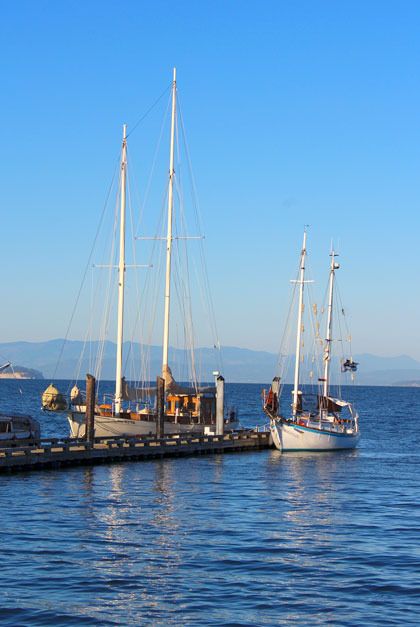The golden rule — to treat others as you would like to be treated — is one imparted to us as children, a sort of general guideline laid out for humans in hopes they will abide by it by being respectful, considerate and kind.
On Aug. 17, the Golden Rule Peace Boat made its way into Penn Cove, an emblem of its namesake and a piece of history.
The vessel first made waves in 1958, when a crew of Quaker anti-nuclear weapons activists sailed defiantly from San Pedro en route to the nuclear test zone at Eniwetok atoll in the Marshall Islands in an attempt to intervene in U.S. government’s atmospheric testing of nuclear weapons in the area.
At that time, both the United States and Soviet Union were conducting aboveground nuclear weapons tests, producing radioactive fallout and contamination, according to the vessel’s sponsoring organization, Veterans for Peace.
The crew’s mission was thwarted, and each of the members of that first expedition were jailed in Honolulu. Their very public protest, however, brought the dangers of nuclear testing to the forefront of Americans’ minds and led to the movement resulting in the Limited Nuclear Test Ban Treaty of 1963.
The guiding principle of the Golden Rule’s crew has always been, and continues to be, the use of nonviolent direct action.
In August, the current crew stopped by to give a presentation at the Coupeville Rec Hall while in the middle of a four-month tour of the Pacific Northwest.
The event was sponsored by Veterans for Peace and the Citizens of Ebey’s Reserve (COER).
During the presentation, Helen Jaccard, Veterans for Peace Golden Rule project manager, explained that their voyage through the Salish Sea is timely because of the U.S. government’s announcement that $1 trillion will be allocated over the next 30 years to “modernize” the nation’s nuclear weapons arsenal.
It is, according to the vessel’s crew, a violation of the Nuclear Nonproliferation Treaty signed by the U.S. July 1, 1968.
Veterans for Peace, along with a group of Quakers, were largely responsible for restoring the Golden Rule when it was sold in a state of disrepair in 2010.
It had changed hands a few times in the decades since its first sailing, and a fierce gale had nearly demolished it where it had been docked in California.
The then-owner, unaware of the wooden boat’s history, nearly torched it in a bonfire, but spared it from the flames upon hearing its tale.
The extensive restoration project was completed in June 2015, at which time the vessel made its way onto the water once again to continue its mission of peace.
Its first destination was the Veterans for Peace Conference. In June 2016, the boat also protested in the waters of Fleet Week in Portland. Jaccard explained that the parade of war ships, like the Blue Angels, is aimed at recruiting young people.
“It makes war sexy and we don’t like that,” she said.
The boat also protested in Port Townsend against the Indian Islands munitions transfer station, which Jaccard said is the largest in the country.
“Not many wooden boats have had a mission in their lives,” Jaccard said.
The Golden Rule crew also touched upon their mission to petition for environmentally responsible disposal of nuclear waste, discussing the dangerous implications of unearthing waste which has been buried.
“This insidious poison is killing everything on earth,” another Golden Rule crew member said.
Jaccard and fellow crew members encouraged attendees to become activists themselves, taking a stand on issues to enforce change.
Though writing letters, speaking amongst friends, and attending information events is helpful, they explained, it will take more direct action to overcome issues like that of the danger of nuclear warfare and munitions.
Jaccard also noted that in each of the ports they have visited, local residents have expressed their own concerns related to nuclear energy or other military-related subjects. For Whidbey, this was the issue of the Growler jet noise, a topic which members of COER who attended the presentation discussed with members of the Golden Rule crew.
Tom Ewell, a member of COER and one of the event coordinators, extended a special thanks to veterans — including those in attendance — for their hand in working with other community members to enact positive change in various regards.
“Veterans are key in addressing some of these military issues,” he said.




